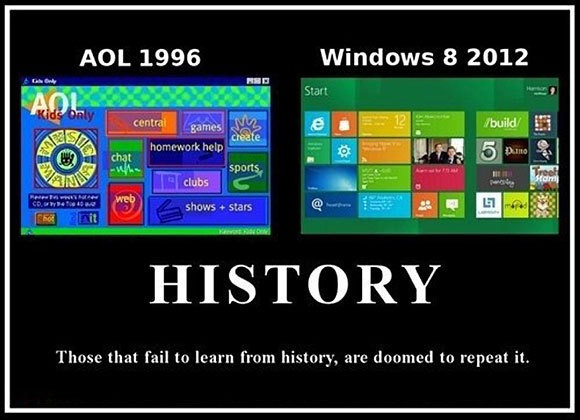TechLarry
RIP [H] Brother - June 1, 2022
- Joined
- Aug 9, 2005
- Messages
- 30,481
jkr266 obviously isn't looking forward to the necessity of re-training 25,000 staff members.
Underneath Metro is a solid OS (well, mine crashed today but we'll let that go for now).
The major interface change was un-needed, from what I can tell by most unwanted, and totally un-necessary. It was, IMHO, lazyness on Microsoft's part so they didn't have to develop a totally separate tablet OS.
MS amazes me in how well it can continue to screw up when it comes to tablets. Then they finally get it right (maybe - we'll have to see) and then they fuck it up all over again by foisting the same OS on desktop users.
Ok, so some like shiny and new. I prefer established and solid. And _I_ sure as hell ain't looking forward to the inevitable re-training of 25,000 users.
Underneath Metro is a solid OS (well, mine crashed today but we'll let that go for now).
The major interface change was un-needed, from what I can tell by most unwanted, and totally un-necessary. It was, IMHO, lazyness on Microsoft's part so they didn't have to develop a totally separate tablet OS.
MS amazes me in how well it can continue to screw up when it comes to tablets. Then they finally get it right (maybe - we'll have to see) and then they fuck it up all over again by foisting the same OS on desktop users.
Ok, so some like shiny and new. I prefer established and solid. And _I_ sure as hell ain't looking forward to the inevitable re-training of 25,000 users.
I don't understand how so many otherwise intelligent and rational people can have such an irrational hate on for something that is so obviously a huge step forward over what came before it. There are legitimate problems with the design of windows 8, but start screen isn't one of them. Take the current start menu, I have a screen that for the time it was initially designed would be considered enormous, both in size and resolution (27" 1920/1200) at that time the size and shape of the start menu made a lot of sense. But on modern screens it takes up well under 15% of your typical monitors screen space, because of that if I need something that isn't in the top "10" list or one of the pinned things I have to do a substantial amount of scrolling to find it. The start screen on the other hand, requires substantially less scrolling because it shows many more things on screen at once. The only even remote downside to the start screen is the fact you can't see what underneath it, but I can't for the life of me think of a time where that would even matter.
Now like I said there are some legitimate bad parts to Windows 8, hot corners work really well for a single monitor but they fall apart pretty quickly with multi monitor setups because it can be hard to hit them without overshooting. Not an unsolvable problem though. Metro apps is another sore point for me, I love the idea of compatibility with rt and wp8 apps, but there just aren't that many apps i use that i deem being worthy of fullscreen, or even split screen, not to mention that again they don't play well with multi monitors. But then metro apps aren't even remotely a requirement, I can happily live my life never having the need to use them, if i find some cool ones that don't bother me too much then all the better if not, that's cool too.
![[H]ard|Forum](/styles/hardforum/xenforo/logo_dark.png)

